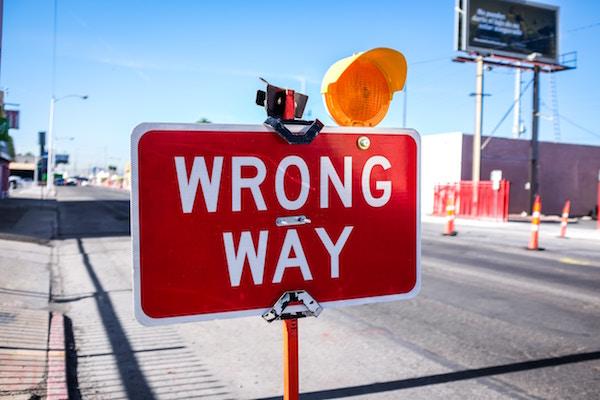3 Interview Mistakes You Don't Know You're Making
Published: Jan 25, 2019

I've spent many years on both sides of the interviewing table. I've interviewed for many positions, and I've interviewed many people for many positions. As an interviewee, I've made many mistakes. I've been unprepared, I've overshared, I've mumbled through answers, I've stumbled through answers, I've spoken too much, I've spoken too little, I've oversold myself, I've undersold myself, and I've made a host of other mistakes, too. And as an interviewer, I've witnessed all of these mistakes, many times, and many other mistakes as well.
While most interview mistakes are obvious to the mistake maker (say, not being prepared for a particular interview question and then having to answer it with, "I don't know"), some mistakes are not that obvious. With respect to these less obvious type, below are three common interview errors you might be making without knowing it.
1. Being reactive not proactive.
It might sound counterintuitive, but you can't just nail every interview question and expect to get the job or, at least, move on to the next interview round. Instead, you have to, in addition to nailing every interview question, tell your interviewer why you're the right person for the job and why you're uniquely qualified. The thing is, your interviewer's questions often don't allow you to do this. And so, you need to continually look for places to drop in your unique qualifications and experiences.
How you do this is partly through preparation. In your interview prep, part of what you need to do is identify and articulate why you're right for the job, what makes you a great candidate, and which of your experiences point to the possibility that you'll likely succeed in the role you're interviewing for.
Then, come interview time, if the interviewer's questions don't allow you to get these things across, you'll need to proactively get them in there. Think of how politicians often answer debate questions: they quickly answer the question they were asked and then speak for several minutes about an issue unrelated to the question they were asked (sometimes, they don't even bother to answer the question they were asked). Of course, the art of being proactive is tacking your answer on smoothly. Which is to say, better than politicians do. Ideally, you want to make sure your uniqueness is not coming out of left field but related to the topic you and your interview are talking about.
2. Hiding your personality.
You can be sure that part of what your interviewer is doing while interviewing you is imagining working alongside you. This includes imagining being in meetings together, working on projects together, talking about your respective weekends together, maybe even traveling to client offices and meeting with clients together. All of which points to your need to be personable in an interview; you need to be yourself.
Of course, this is easier said than done. Interview stress and anxiety is real; there can be a lot riding on interviews and so it's only natural to be nervous. But what if you could trick yourself into being yourself and telling yourself something like: "If I go into this interview and remember to be myself, not try to be anything I'm not, and I don't get the job, or the interview doesn't go well, or I don't gel with my interviewer, then this job just wasn't meant to be. No big deal."
I think, if you could do that, you'll be a lot calmer in your interview and a lot less stressed out. Plus, you'll come across as someone likable, someone who'll make a great colleague, someone to recommend for the next interview round.
That said, you don't want to relax so much that you speak with your interviewer like you would your best friend. You want to keep your conversation professional, but by all means, let your emotions come through when the conversation turns to topics that excite or interest you.
3. Crossing your limbs.
You've probably heard and/or read that body language is important. It is, that's true. But here's the thing: you don't need to learn about and practice all sorts of "power poses." Those likely won't help you. Not in interviews, at least. (I don't know, maybe they will help you once you rise to chairperson of the board; once you do that, you can try leaning back in your swivel chair, kicking your feet up on the boardroom table, and putting your arms behind your head to exude and improve your confidence).
For the time being, in interviews, this is all you need to remember when it comes to body language: sit up straight with your back as upright as possible, don't cross your arms, don't cross your legs (don't spread them either), and maintain eye contact. If you follow these basic body language rules, you'll already be ahead of the majority of interviewees.
Thing is, when you sit up straight, you exude seriousness and professionalism (and you'll find that you act more serious and professional). When you uncross your arms and legs, you'll appear to be open and honest (and you'll feel yourself being more open and honest). And when you maintain eye contact, you'll come across as focused, present, and very interested in the conversation you're having (and you'll find that your focus, presence, and interest will be stronger as a result).
